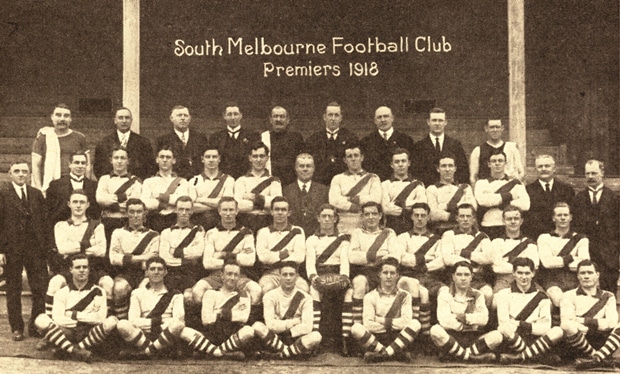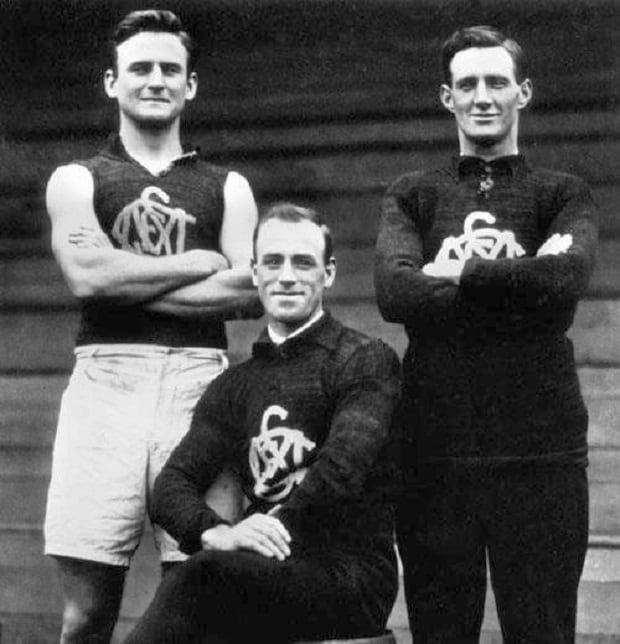Mark Tandy will forever hold a special place in Sydney Swans history.
In the closing moments of the 1918 grand final, he made a surging run down the wing at the MCG after Collingwood had edged a point clear. He kicked the ball long to the square, setting up a scramble from which Chris Laird soccered the winning goal.
It was the Club’s second premiership, coming on top of the breakthrough win in 1909, and one of countless key moments in a wonderful career.
If he was born 100 years later, Tandy, who played 207 games for South Melbourne from 1911-26, would have had a huge collection of interesting and colourful stories.
A Yarraville product who started as a wingman and finished a brilliant rover, Tandy would play in South’s second premiership in 1918, became skipper in 1922, a Victorian representative 13 times and an inaugural member of the AFL Hall of Fame in 1996.
He was named in the Swans Team of the Century in 2003 and in 2009 was an inaugural inductee to the Club’s Hall of Fame in recognition of a career that spanned a challenging period for the game, and some significant moments in Swans and League history.
The stories Tandy could tell are countless.
Having debuted as an 18-year-old in 1911, in the last season before the introduction of jumper numbers, Tandy was barely 21 with just 29 games behind him when the First World War broke out in 1914.
Not only did he see teammates and friends go off to join the war effort but he saw the demise of the University Football Club, who with Richmond had joined South Melbourne, Carlton, Collingwood, Essendon, Fitzroy, Melbourne and St Kilda in the VFL in 1909.
In 1916, he was a 61-game veteran and a member of the South team that, with Essendon, Geelong, Melbourne and St Kilda, pulled out of the competition in respect to the war effort.
With South, he re-joined the competition in 1917 and shared in the 1918 premiership triumph in his 91st game, three months after playing in a game that is part of club folklore for reasons totally removed from football.
As is recorded in the official Swans history 'In the Blood' by author Jim Main, the Swans suffered an unexpected five-point loss to St Kilda at Junction Oval on June 3, 1918.
As Tandy explained many years later to the South Melbourne Record, the match was played on the King’s Birthday Monday holiday after the South players had spent the previous two days enjoying the hospitality of a club patron at his holiday home in the Dandenong’s.

South Melbourne's 1918 Premiership side.
The Club history included his colourful recollections of the afternoon.
“Some of the boys were wobbling at the knees when they walked from the St Kilda tram to the St Kilda oval,” Tandy reportedly said.
“Fair dinkum, when some were dressed to go out on the field they had to be headed in the direction of the arena gate and given a shove-off. That they even saw the game out was a miracle,” he reportedly said.
In Round 12, 1919, Tandy played in a record-breaking 171-point win over St Kilda, with South scoring 29.15 (189) to the Saints’ 2.6 (18). It was the highest score in VFL history until Richmond scored 199 points in 1931, and the biggest winning margin in VFL history until Collingwood beat St Kilda by 178 points in 1979.
South kicked a remarkable 17.4 (106) in the fourth quarter in what remains the highest single quarter score in all-time VFL/AFL history 98 years later.
In the same game South’s Harold Robertson kicked 14 goals, including 11 in the second half and seven in the final quarter, to set a club record that stood until Bob Pratt kicked 15 goals in a game in 1934.
In 1921, when South wore red jumpers, Tandy played in the first game for South by the legendary Roy Cazaly, a champion ruckman who had transferred from St Kilda to join Fred Fleiter and Tandy in a famed first ruck trio.
He played under Cazaly when he took over as coach in 1922, sharing the captaincy with the man whose named was later invoked as a catchcry on the battlefields in the Second World War, and was the basis for a famous song by Mike Brady released in 1979 to promote Channel 7’s football coverage.
As legend has it, ruck-rover Fleiter was the first to call ‘Up there, Cazaly’ when Cazaly flew for the ball.

(Left to right) Fred Fleiter, Mark Tandy and Roy Cazaly.
Tandy also played in 1923, when South dumped Cazaly in favour of Collingwood star Charlie Pannam, only to see Collingwood refuse a clearance for the new South captain-coach. Only 25 at the time, Pannam was forced to be a non-playing coach until 1926.
In 1924, Tandy received a special prize from the Club for not missing a training session in a season in which the VFL reverted to the round-robin finals series which had been used in the inaugural season in 1897.
Also in 1924, Tandy finished equal fifth in the first Brownlow Medal, in which only the player judged best afield received a vote. He polled three votes to head the South vote from Cazaly (2), Jack O’Connell (2) and Arthur Hando (1).
Tandy was part of the South side that played Footscray, Hawthorn and North Melbourne for the first time after they joined the competition in 1925, and which played for a club best and fairest for the first time in 1926. It was won by Cazaly, who was an inaugural Legend in the AFL Hall of Fame in 1996.
If he were still alive, Tandy could confirm the origins of his inglorious nickname ‘Napper’ which, according to folklore, arose because of propensity for 'switching off' during games despite Cazaly reportedly rating him the finest rover he saw.
And he would explain why he wore no less than five different numbers in his event-charged career: 25, 27, 26, 2 and 12.
Also among the dates that would figure prominently in the Tandy career is August 8, 1925.
Ninety-two years ago Tandy became the second player to play 200 games for the Swans behind the legendary Vic Belcher, South’s first dual premiership player in 1909 and 1918, South captain in 1913-17 and 1920, and a compatriot of Tandy in the South Team of the Century and the AFL Hall of Fame.
Tandy was 26 days short of his 33rd birthday when South beat Footscray by five points at Lake Oval in his 200th game. Ted Johnson and Fred Winbridge kicked five goals each.
Tandy died on May 19, 1965, aged 72, but more than a half century later remains 28th on the Swans’ all-time playing list of 1411 players, and the fifth oldest to 200 games – younger only than Stuart Maxfield (33), John Rantall (33), Andrew Dunkley (33) and Rod Carter (34).


